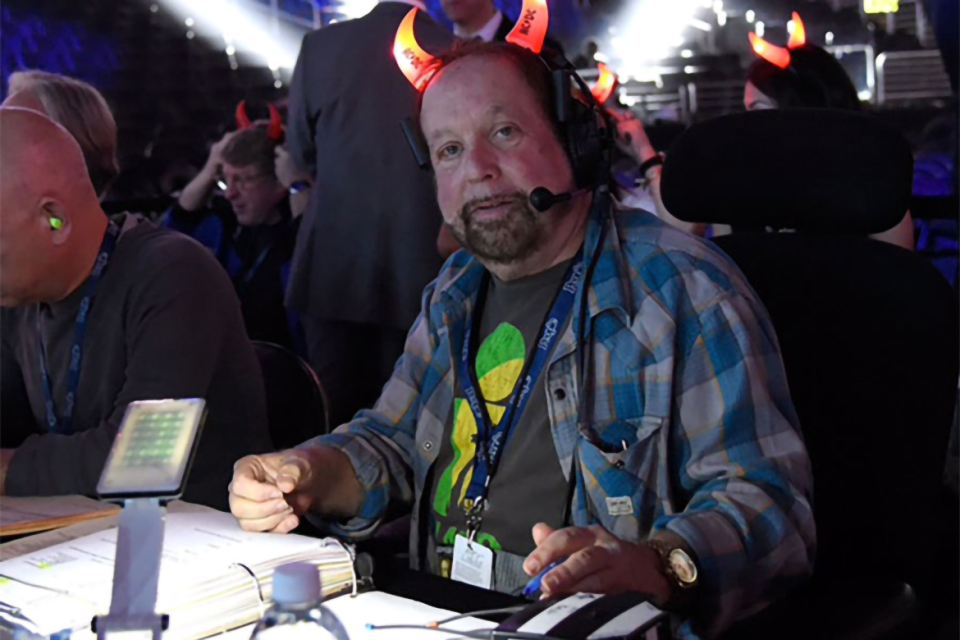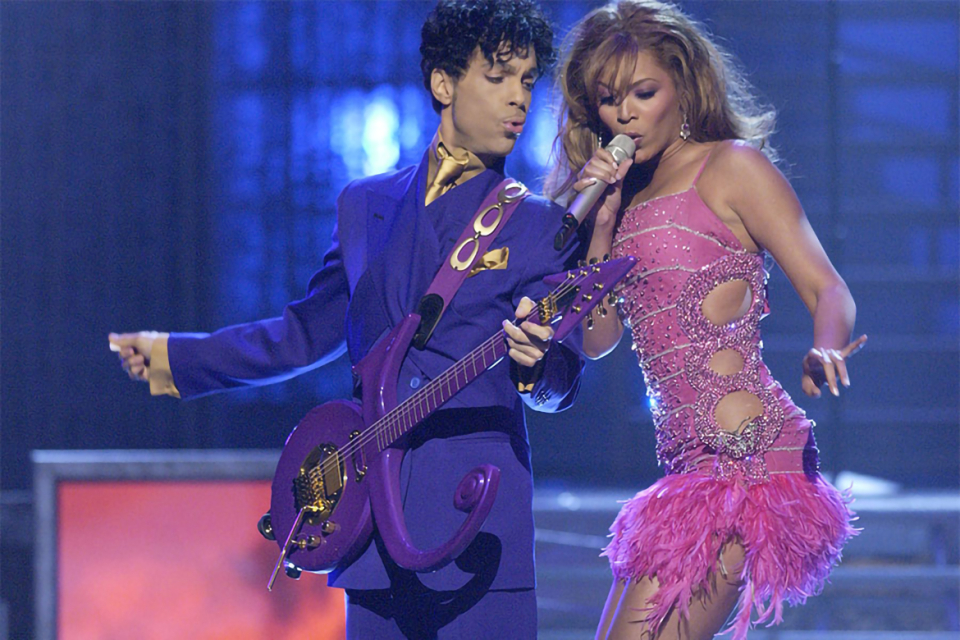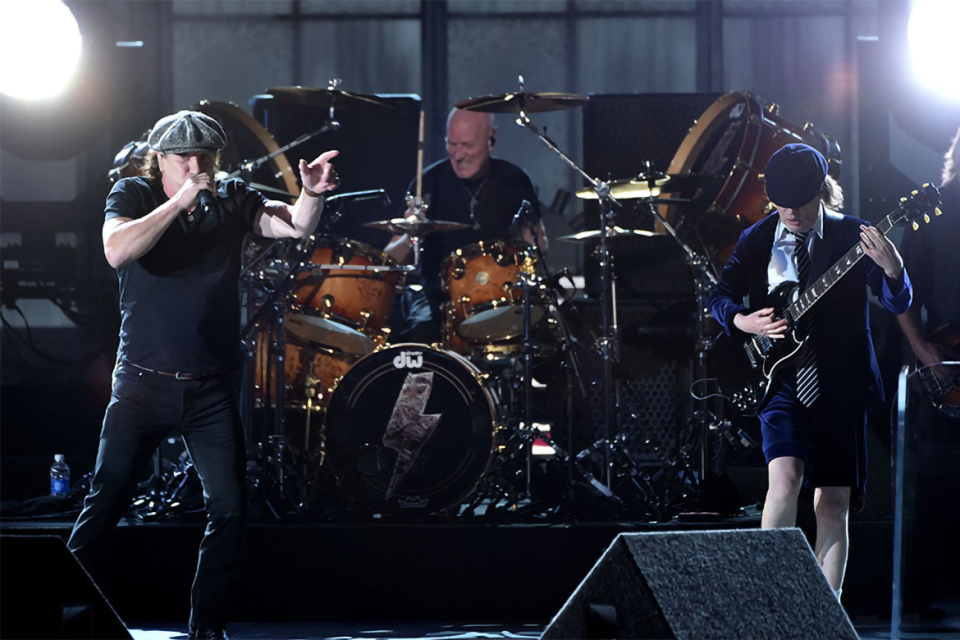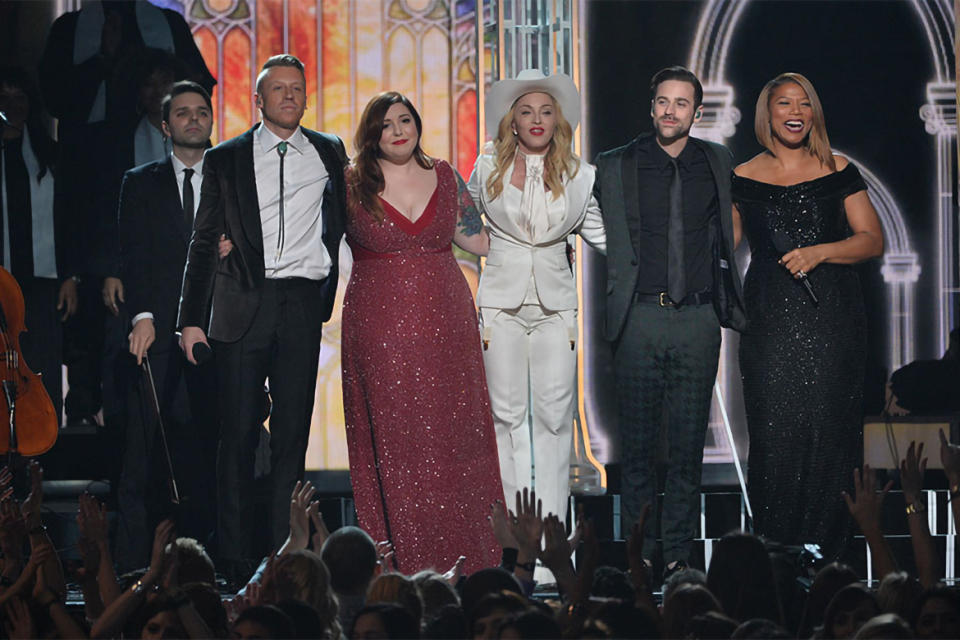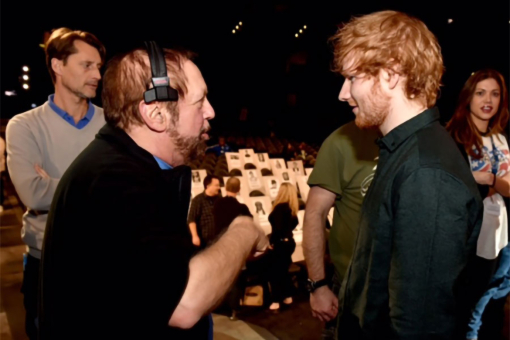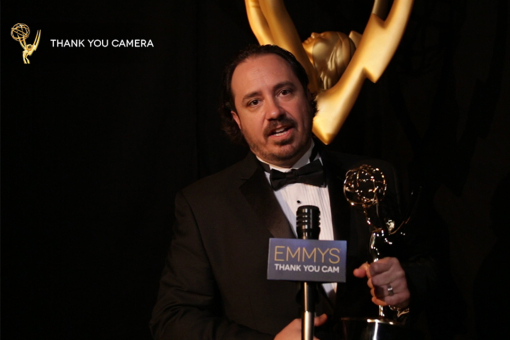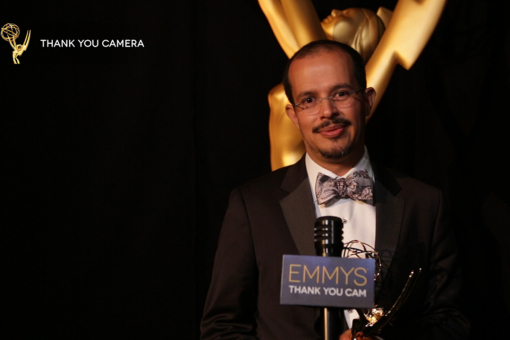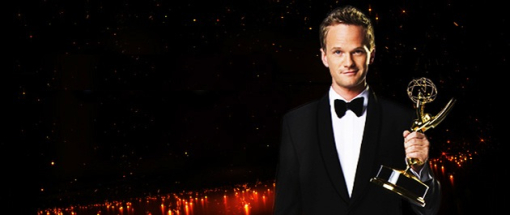In 2004, Prince and Beyoncé – arguably two of the best live performers of our time – opened the Grammys with a duet, a medley: "Purple Rain/Baby I'm a Star/Let's Go Crazy/Crazy in Love."
If you saw it, you likely remember it: Beyoncé shimmied in a short pink dress standing back-to -back with Prince in his trademark purple. What you might not know is that Beyoncé initially did not want to take part.
It was the year her record, "Crazy in Love," was nominated, and she had a vision for how she wanted to perform the song "Dangerously in Love" off the album, recalls Grammys Producer Ken Ehrlich.
But Ehrlich, the show's executive producer for 35 years now, has a way of getting things to work out. In this case, he really had to: Prince was already on board. In fact, "by that time, he'd laid out the entire act he wanted to do with her," Ehrlich recalls.
He went to see Beyoncé at a photo shoot and spent several hours there, waiting for her as he tried to convince Beyonce's mother, Tina Knowles, to agree to the number, but she was firmly in her daughter's court.
Finally, "I said I can see how passionate you are about doing your song and you're right but I need you to open the show with Prince," he recalls. She agreed, and with Ehrlich planned two numbers, the opener and her own. (And all this with just a few weeks until the show aired.)
After the performance, of course, Beyoncé's reaction was to tell Ehrlich that it was one of the highlights of her life. And when he asked her a few years later to perform with Tina Turner, she said yes with no hesitation.
Ehrlich says he has a zillion more stories like that, and the resulting "book" that comes of them is an 18-minute highlight reel of his 35 years producing the show.
The Beyoncé-Prince number is there, as are dozens of others: the cast of "Hamilton" performing on its own stage; Mumford and Sons as new artists paired with Bob Dylan, in a performance said to have rocked the band to stardom; Taylor Swift and Miley Cyrus, practically babies, doing an acoustic number; AC/DC opening the show quite explosively in 2015; an extremely pregnant M.I.A. performing with Jay Z, T.I., L'il Wayne and Kanye West in 2009; Melissa Etheridge taking the stage still bald from cancer treatments; Macklemore & Ryan Lewis with Madonna and Mary Lambert, singing "Same Love" and "Open Your Heart" as 34 couples – gay and straight and extremely diverse – were wed on stage by Queen Latifah as officiant in 2014; an incendiary performance by Kendrick Lamar in 2016 that paid tribute to the Black Lives Matter movement.
The list can go on. Way, way on. Incredibly, the 18-minute reel is just a tiny fraction of the myriad performances Ehrlich has conceived and overseen during his tenure. The Grammys, which this year air Feb. 12, don't rely on a lot of envelope-opening; instead, each year's show is a one-time-only celebration collecting musical moments that are ultimately surprises.
"Ken is great at coming up with things people don't expect," said Terry Lickona, executive producer of Austin City Limits and a Grammys co-producer for about 15 years now. (Lickona counts the tribute to the Clash featuring Bruce Springsteen, Elvis Costello, Dave Grohl and Steven Van Zandt in 2003 as his favorite Grammys moment.)
David Wild, a Rolling Stone contributing editor and Grammys writer for 15 years, said the moments matter to more than just the audience. Not only does Ehrlich craft "career-making performances," but he also delivers a show whose awards really mean something to the artists.
He recalls standing backstage with Bruce Springsteen and Eminem in a year both men were nominated. "And you realize the vulnerability of these people who are so iconic," he said. "They both wanted it so much."
If you're a music lover who takes the Grammys' word as gold, or a skeptic who shakes your head at each year's nominations, the fact of the matter is this: The Grammys is a three-and-a-half hour live concert featuring dozens of performers, stage set-ups and numbers that are often performed on a one-time-only basis.
It doesn't follow the more scripted format of many awards shows, so even if you watch the show with misgivings because maybe your favorite artist or album was overlooked, it's arguably one of the most complex and amazing awards shows of the year.
"The Grammys is the most physically and creatively ambitious awards show there is," Wild said. "You'll never see anything like it." What's more amazing is that – in a show with "a thousand moving parts…you can't imagine how many things DON'T go wrong."
Even more amazing is that, in December, just a few months out, the show is not planned out in full.
Visiting Ehrlich at his Sherman Oaks office the week before Christmas, you notice something: It's dead quiet. Not exactly the expectation for a production facility just a month or so from a huge TV event. But the stars are vacationing, and Ehrlich is, well, admitting some frustration. But, every year, the show goes on. We talked to him a little bit about how that happens.
So, the nominations came out recently. Do you think about the show and what you're hoping for ahead of time or do you let yourself be surprised? How do you do it?
You just stay in music all year long. You can't turn it off. I actually like it. I probably stay in it, paying attention to everything, most of the year, though there is a point almost every year in the middle of September when the nominations close [Grammy nominations include releases from Oct 1 to September 30 of each year] so there does come a time usually in September when I say, "this is the worst year in the history of music, how am I ever going to make a show?"
And then we start thinking about what we can do to change that. And you know the fun of it is in basically doing that. Coming up with ideas, thinking of putting people together, looking for maybe some gems that haven't been on every other TV show or awards show. That's the process.
And where does that put you now, in the end of December?
In December, nominations come out the first week, and by that time I've probably had conversations with 12, 13 or 14 of our core artists, people I think are going to get nominated.
Those conversations usually involve me saying, "I can't make an offer to you right now but let's talk about what might happen if you get nominated." Because the production period for the show is incredibly short and in the middle of it are two weeks when there's no one answering phones. They're in St. Barts, Hawaii … they don't want to talk to me.
So you're always thinking but everyone else is doing whatever.
I can get some of them to focus, not enough.
You do have your go-to artists who appear with some frequency.
I don't think I make a list but I divide the show into newbies – people we're working with the first time and then artists who are coming back because they have significant careers, continue to make really great music and they get nominated. And they're good live performers. That's the key.
I have no problem saying this to the people at the Recording Academy: you can make the greatest record in the world but if you can't do what those 40 people did on that reel, then I don't know. That reel, every year we update it and I have to take things off and look at what I need to take off or even things that never made it and every year I watch and think we have a pretty good track record of really great performances.
There are a lot of huge moments on that reel. What's amazing is this show is a one-time, huge concert event with so many pieces, between the actual stage set-ups and the people involved. It's never to be repeated so looking back on it, is it hard to one-up yourself?
I'm proud of those things and the people who've worked on the show behind the scenes, a lot of them on it for a long time who are really dedicated to it and know that we won't settle for at least trying to achieve greatness. And the artists have that feeling.
The Grammys – and no disrespect to any other awards shows – the Grammys mean more to these artists. They know that they're going up against their most significant competition. Don't let any artist tell you, "oh no, I'm not competitive" because they are, and they want to be the best thing on the show. They will do whatever they have to do to get there.
So, when you came on as producer in 1980, do you remember that first show, was it something you always wanted to do?
Oh yeah, I always wanted to do it. I moved out here in 1976 after doing a number of specials, and also [producing] The Midnight Special for a year. I had met with Pierre Cossette, he owned and produced [the Grammys]. It was February 1976 – my wife was pregnant and I had a meeting with Pierre, who said "how'd you like to come to the Grammys?"
I had been doing a show in Chicago called Soundstage on PBS. It was this music series and it was kind of eclectic – Gordon Lightfoot, Randy Newman, Jim Croce, Dylan did the show – it was a cool show. It was not a big popular show but it was one of the few things PBS did at the time to get kids.
So when I came out and had this meeting with Pierre. It was like the day before the Grammys and Harriet was 7 months pregnant. He had been told and was aware of the show and said, "Maybe someday I'll talk to you about doing the Grammys." He had a producer and director who'd been doing the show since it had become a network show.
We were staying at the Continental Hyatt on Sunset. People called it the Riot House, and that was where I wanted to stay... He said, "Do you want to come to the Grammys?" This was when it was at the Palladium. He said, "I don't have seats for you but we have bleachers in the back of the house just to the left of the right of the center camera platform."
I of course said yes. Harriet was pregnant and had nothing to wear. We had to go to a trendy boutique that had maternity clothes on Sunset Plaza. We found this thing it was very 1970s maternity – I still remember it was more expensive than anything I'd ever bought her.
It's funny, I don't remember a lot of the show but I remember Barry Manilow was on the show … I think Paul Simon might have won something, Stevie [Wonder] was on the show, I think.
I said to Harriet, "This is my dream." It took three more years. I did The Midnight Special, a couple of Bee Gees specials, I did a Ringo Starr special, I did a Billboard awards show, and then Pierre called: he was not happy with the prior year's show and he asked if I wanted to produce the Grammys. It wasn't a hard answer. I started in 1980.
Do you remember your first show?
Do I remember that first show, yeah.
Neil Diamond and Barbra Streisand were on together and they'd never performed together. And I remember the D's. Neil Diamond, the Doobie Brothers, and they'd never been on the Grammys before and were very rock and roll for the Grammys which were still very Herb Alpert. Dionne Warwick had a big hit called "I'll Never Love This Way Again," which I loved. Big power ballad. And Dylan.
It was really interesting because one thing about Pierre, he was a businessman – I don't want to speak ill of the dead but he wasn't a TV producer, so he basically threw me in. The best part of the whole thing was here I was on a big stage, working with a number of artists that were new to me – it was a 2-hour show, we probably did somewhere between 8 to 10 performances. (Now the show is 3.5-hours and there are approximately 19 acts.)
Besides the length going up, did you make significant changes when you started?
It just got bigger. It wasn't me, it was Pierre. When we did the 25th Grammys in 1983, that was when CBS said, "let's try making it a three hour show and see what happens, what the ratings are" and then we never went back.
You have to take some credit for that right?
Well, it honestly became hard to do this show in two hours. It's hard to do in three and a half hours. There are still things that get left behind that I don't get to do. I have a pretty good memory for most of the shows. I have a tendency to forget the negative. It's in my makeup. If you ask me what happened in any given year and I look at the sheet, I'll tell you about all the good stuff and bury the bad.
Of course, with a live show, it comes with the territory.
But it seems like what people will remember are the highlights. I think what's crazy is that you work these big spectacles each year and you do them once and have to start from scratch for bigger, better the next year. So, where are you right now mentally?
Right now I'm very unhappy. Because we're in that river Styxian, putting the paddle in the river to go upstream. I can't get a hold of anyone, everyone is gone. There are a few things I have set. The bookings are pretty good at this point.
Out of the 18 or 19 performances , I have 10 or 11 confirmed that we'll hopefully start to talk about in production but most of them don't want to talk about it. Last week was the first creative meeting with our stage, lighting, screen people. I send them off with some ideas and they start thinking about what to work on.
So, you're in the River Styx now but you make it out every year. Do you almost need that low point to get to the high?
Well, you hope so. Right now, there are four or five numbers in the show that have the potential of being that big moment and you hope that the rest will build their way toward that.
What we really try not to do frankly is have an act that says, "This is what I want to do, it's my latest single and I hope you like it." Because we're at the end, and by the time they come to us they've done Fallon, Kimmel, Ellen. If they haven't done MTV they'd done the AMAs.
And you don't want them trotting out the same thing the audience has already seen.
Nope. So I will go to them and they'll be surprised and we'll talk, and they'll say , "we thought about doing blah-blah-blah" and I'll say, "You did that on the AMAs but I have a song on the album that is untouched as far as I know and I think it would be a virtuoso performance on this show."
Sometimes they say, "you know, 'that's blank's favorite song' or they say, 'you're out of your mind… it's never going to be a single, etc.'" And then I say this line that they're almost used to hearing, 'I'm not interested in selling your next single. I'm interested in elevating your artistic career." And that's what we're trying to do and that's what it does.
Two-thirds of what I put on that reel each year has little or nothing to do with the artist's nominated song but people remember it.
For Part II of our exclusive interview, click here.

